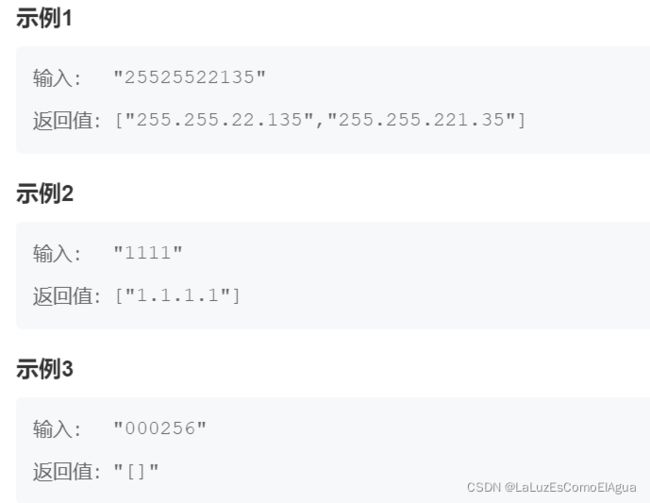- Redis架构
zyz176
Redis架构Redis是一个单线程的架构单线程和多线程:单线程效率低,安全多线程效率高,有线程安全问题简化了数据结构和算法的实现:Redis采用了事件模型的机制I/O多路复用机制(Linux处理文件读取的机制)单线程异步回调:node.jsRedis是一个单线程,为什么效率还这么高?redis是基于内存的,他的读取速度本身就很快使用单线程,避免了cpu对线程的切换,在一点程度上提高了效率redi
- python期末题库和答案,python 期末卷及答案
www55597
人工智能
大家好,给大家分享一下python期末题库和答案,很多人还不知道这一点。下面详细解释一下。现在让我们来看看!6.foriinrange(2,n):ifn%i==0:breakifi==n-1:print('是素数')else:print('不是素数')7.'abcabcabc'.count('abc')的值为__3__。8.对于有else子句的for循环和while循环,但循环因循环条件不成立而自
- 轻量级限流算法的实现,拿走即用!
程序员
引言在后端服务里,流量控制是确保系统稳定运行的关键之一。今天给大家介绍一个非常简单的漏桶限流算法的实现,很轻量级,无需任何第三方依赖。packagewin.liyufan.im;importjava.util.HashMap;importjava.util.Iterator;importjava.util.Map;/***漏桶算法*/publicclassRateLimiter{privatest
- 小红书成立应用算法部:平衡生态与变现的战略之举
前端
小红书近期将商业化、社区、电商算法部门整合,成立了全新的“应用算法部”,这一举动引发了业界广泛关注。这不仅体现了小红书对算法驱动增长的高度重视,也标志着其在平衡内容生态和商业变现之间迈出了关键一步。本文将深入探讨小红书成立应用算法部的战略意义及其对未来发展的影响,并分析其扁平化管理模式在其中的作用。作为一款以内容创作和分享为核心的平台,小红书对高效的AI写代码工具的需求日益增长,而算法的优化则成为
- python的schedule模块
weijiuzhu007
python
这里写自定义目录标题一,schedule模块1.什么是schedule模块2.具体应用二,详细源码一,schedule模块1.什么是schedule模块schedule模块进行job管理,具体可以执行定时任务,schedule方法是串行的,也就是说,如果各个任务之间时间不冲突,那是没问题的;如果时间有冲突的话,会串行的执行命令2.具体应用1,安装方法pipinstallschedule2,使用im
- 华为OD机试C卷--手机App防沉迷系统(Java & JS & Python & C)
飞码创造者
华为OD机试题库华为odc语言javajavascriptpython
获取题库不需要订阅专栏,可直接私信我进入CSDN领军人物top1博主的华为OD交流圈观看完整题库、最新面试实况、考试报告等内容以及大佬一对一答疑。题目描述智能手机方便了我们生活的同时,也侵占了我们不少的时间。“手机App防沉迷系统”能够让我们每天合理地规划手机App使用时间,在正确的时间做正确的事。它的大概原理是这样的:1.在一天24小时内,可以注册每个App的允许使用时段2.一个时间段只能使用一
- 传感器融合(UWB+IMU+超声波),使用卡尔曼滤波器和3种不同的多点定位算法(最小二乘、递归最小二乘和梯度下降)研究(Matlab代码实现)
科研_研学社
算法matlab开发语言
欢迎来到本博客❤️❤️博主优势:博客内容尽量做到思维缜密,逻辑清晰,为了方便读者。⛳️座右铭:行百里者,半于九十。本文目录如下:目录⛳️赠与读者1概述一、引言二、传感器介绍(一)UWB(超宽带)(二)IMU(惯性测量单元)(三)超声波传感器三、定位算法(一)卡尔曼滤波器(二)多点定位算法1.最小二乘法2.递归最小二乘法3.梯度下降法四、系统架构五、实验设计六、结果与讨论七、结论2运行结果3参考文献
- 探索AI API版本管理与流式传输实现
qwe54165a4wd
人工智能java数据库python
在现代软件开发中,API版本管理是一个关键的主题,尤其是在涉及到AIAPI的场景。API版本的变更会影响到服务的稳定性和功能的兼容性。因此,理解API版本管理的基本原理和具体实现,对于开发者来说至关重要。技术背景介绍API版本管理涉及到如何在不破坏现有客户端代码的情况下,逐步引入新的功能和改进。这对于AI服务尤为重要,因为AI模型和算法的更新频率相对较高。本文将重点介绍AIAPI版本的管理原则,并
- 【Django DRF Apps】从零搭建一个Django SSE app应用
患得患失949
DjangoDRF封装功能类djangosqlitepythonSSEapp
一、从零开始搭建DjangoSSE应用(一)创建Django项目安装Django首先确保已经安装Django。如果没有安装,可以使用以下命令进行安装:pipinstalldjango创建Django项目创建一个新的Django项目:django-adminstartprojectsse_projectcdsse_project创建Django应用创建一个新的应用来处理SSE:pythonmanag
- 2017-SIGGRAPH-Google,MIT-(HDRNet)Deep Bilateral Learning for Real-Time Image Enhancements
WX Chen
HDR技术深度学习神经网络机器学习
双边网格本质上是一个可以保存边缘信息的3维的数据结构。对于一张2维图片,在2维空间中增加了一维代表像素的强度slice操作(上采样)BilateralGuidedUpsampling这篇文章用双边网格实现图像的操作算子的加速。算法的核心思想是将一幅高分辨率的图像通过下采样转换成一个双边网格,在双边网格中每个格子就是一个图像的仿射变换算子,它的原理是在空间与值域相近的区域内,相似输入图像的亮度经算子
- 华为OD机试 - 手机App防沉迷系统(Python/JS/C/C++ 2024 D卷 100分)
哪 吒
华为odpythonjavascript算法七日集训
华为OD机试2024E卷题库疯狂收录中,刷题点这里专栏导读本专栏收录于《华为OD机试真题(Python/JS/C/C++)》。刷的越多,抽中的概率越大,私信哪吒,备注华为OD,加入华为OD刷题交流群,每一题都有详细的答题思路、详细的代码注释、3个测试用例、为什么这道题采用XX算法、XX算法的适用场景,发现新题目,随时更新。一、题目描述智能手机方便了我们生活的同时,也侵占了我们不少的时间。“手机Ap
- 021:为什么是卷积呢?
董董灿是个攻城狮
计算机视觉保姆级教程人工智能计算机视觉CNN
本文为合集收录,欢迎查看合集/专栏链接进行全部合集的系统学习。合集完整版请查看这里。卷积算法非常重要,但是为什么是卷积呢?在进一步学习之前,先看一看神经网络(或者叫一个AI模型)是如何完成一张图片的推理的。你肯定听说过阿尔法狗大战柯洁的故事,当时新闻一出,不知大家什么反应,反正我是被震撼到了:AI模型竟然学到了那么多的棋谱,而且人类在AI的面前毫无还手可言。但是,你有没有想过一个问题:阿尔法狗学会
- 对于编程零基础,第一个语言是 Python 的人有什么建议?
cda2024
python开发语言
在当今数字化时代,编程已成为一项必备技能。无论你是想成为一名专业的软件开发人员,还是希望在数据分析、人工智能等领域有所建树,掌握一门编程语言都是至关重要的第一步。对于许多初学者来说,Python是一个理想的选择。它不仅语法简洁易懂,而且拥有强大的社区支持和丰富的库资源。那么,对于编程零基础且选择Python作为第一门语言的人,有哪些实用的建议呢?1.建立正确的学习心态1.1持之以恒学习编程并不是一
- 通达信Python语言接口:如何轻松获取并高效利用?
cda2024
python开发语言
在量化投资和股票分析领域,Python已经成为不可或缺的工具。然而,如何将Python与国内最流行的股票交易软件之一——通达信相结合,成为许多投资者和开发者关心的问题。本文将详细介绍如何获取通达信的Python语言接口,并提供一些实用的技巧和示例代码,帮助你在量化交易中更上一层楼。什么是通达信Python接口?通达信Python接口是通达信官方提供的一个API,允许用户通过Python脚本调用通达
- 华为OD机试E卷 - 手机App防沉迷系统(Java & Python& JS & C++ & C )
算法大师
最新华为OD机试华为odjavapythonc语言c++javascript华为OD机试E卷
最新华为OD机试真题目录:点击查看目录华为OD面试真题精选:点击立即查看题目描述智能手机方便了我们生活的同时,也侵占了我们不少的时间。“手机App防沉迷系统”能够让我们每天合理地规划手机App使用时间,在正确的时间做正确的事。它的大概原理是这样的:在一天24小时内,可以注册每个App的允许使用时段一个时间段只能使用一个AppApp有优先级,数值越高,优先级越高。注册使用时段时,如果高优先级的App
- PyCharm安装PyQt5及工具详细教程
JustLikeRun
pycharmqtidepyqt
PyCharm安装PyQt5及工具详细教程PyCharm是一款功能强大的Python集成开发环境(IDE),而PyQt5是一个用于创建GUI应用程序的流行Python库。在本教程中,我将指导您如何在PyCharm中安装PyQt5及其相关工具,并提供相应的源代码示例。步骤1:安装PyCharm首先,您需要下载并安装PyCharm。您可以从JetBrains官方网站(https://www.jetbr
- Python从0到100(七十三):Python OpenCV-OpenCV实现手势虚拟拖拽
是Dream呀
pythonopencv开发语言
前言:零基础学Python:Python从0到100最新最全教程。想做这件事情很久了,这次我更新了自己所写过的所有博客,汇集成了Python从0到100,共一百节课,帮助大家一个月时间里从零基础到学习Python基础语法、Python爬虫、Web开发、计算机视觉、机器学习、神经网络以及人工智能相关知识,成为学习学习和学业的先行者!欢迎大家订阅专栏:零基础学Python:Python从0到100最新
- 华为OD机试E卷 --第k个排列 --24年OD统一考试(Java & JS & Python & C & C++)
飞码创造者
最新华为OD机试题库2024华为odjavajavascriptc语言python
文章目录题目描述输入描述输出描述用例题目解析JS算法源码java算法源码python算法源码c算法源码c++算法源码题目描述给定参数n,从1到n会有n个整数:1,2,3,…,n,这n个数字共有nl种排列。按大小顺序升序列出所有排列的情况,并——标记,当n=3时,所有排列如下:“123"“132”“213”“231"“312"“321”给定n和k,返回第k个排列。输入描述输入两行,第一行为n,第二行
- 期末python试卷(1)
泰山小张只吃荷园
python网络开发语言开源汇编程序人生学习方法
目录一、判断题二、选择题三、填空题一、判断题1.Python是一种解释型、面向对象的编程语言。2.Python中的变量名只能由字母、下划线、数字组成,且不能以数字开头。3.Python中多分支可使用IF-ELIF和SWITCH-CASE语句来实现。4.表达式中包含多个运算符时,计算顺序取决于运算符的结合顺序和优先级。5.x=’Tom’,那么执行语句x+=’Tom’之后,x的id不变。6.Pytho
- Python调用另一个py文件并传递参数的全面解析
cda2024
pythonjava服务器
在Python编程的世界里,模块化和代码复用是提高开发效率的重要手段。当你面对复杂的项目时,将功能拆分成多个文件不仅有助于团队协作,还能提升代码的可读性和可维护性。然而,如何在一个py文件中调用另一个py文件,并且能够传递参数呢?这正是本文要探讨的核心问题。通过本文,你将了解到几种常见的方法及其应用场景,帮助你在实际开发中更加游刃有余。1.使用import语句1.1基本用法最直观的方法就是使用im
- 使用Python开发SolidWorks API
SolidWorksAPI
SolidWorks二次开发SolidworksAPIpython
使用Python开发SolidWorksAPI介绍本文介绍了如何使用Python与SolidWorksAPI进行交互,创建零件草图、特征及插入文本。我们将通过一个简单的示例,展示如何在SolidWorks中进行自动化操作,利用Python脚本创建一个带有矩形特征的零件,并向草图中插入文本。前提条件安装了SolidWorks和Python。配置了pywin32库来与SolidWorks进行交互。可以
- 库存python whl文件免费下载(2)
科技小游侠
pythonpython
库存pythonwhl文件免费下载(1)库存pythonwhl文件免费下载(2)库存pythonwhl文件免费下载(3)库存pythonwhl文件免费下载(4)库存pythonwhl文件免费下载(5)最近发现收藏的whl下载链接https://www.lfd.uci.edu/~gohlke/pythonlibs/已经走丢了,网上检索了下,还可以下载到历史的whl文件,为了防止下载链接再次失效,索性
- Python处理Excel数据
王肇朋
excelExcelEXCELofficepythonPython
Python处理Excel数据2012-08-0210:07:32我来说两句收藏我要投稿前段时间做了个小项目,帮个海洋系的教授做了个数据处理的软件。基本的功能很简单,就是对Excel里面的一些数据进行过滤,统计,对多个表的内容进行合并等。之前没有处理Excel数据的经验,甚至于自己都很少用到Excel。记得《Python核心编程》的最后一章里有讲到用Win32COM操作office,看了一下讲的不
- python正则表达式re关于数字、字母、特殊字符、汉字的匹配方式
乙龙
python开发语言
在Python中,正则表达式是通过re模块来实现的。正则表达式是一种强大的文本处理工具,用于匹配、搜索、替换或分割字符串。以下是一些基本的正则表达式模式,用于筛选不同类型的字符:数字(\d):匹配任意数字(0-9)。示例:\d可以匹配“123”中的每个‘1’,‘2’,‘3’。字母([a-zA-Z]):匹配任意大小写的英文字母。示例:[a-zA-Z]可以匹配“HelloWorld”中的每个‘H’,‘
- python中的两种循环
怎么昵称都被占用啊
python练习python
python中的两种循环for循环(计数循环)while循环(条件循环)两种循环的区别range函数跳出循环break示例continue示例循环嵌套循环练习循环,三大语言结构之一,当它满足条件时反复执行某一段代码的过程,在python中有两种循环命令,分别为for循环和while循环for循环(计数循环)python中常用的循环结构之一,可以遍历一个可迭代对象中的元素。因为for循环的循环次数是
- 《python基于时间序列分析的降雨量预测系统》毕业设计项目
陈辰学长
python课程设计开发语言
大家好,我是陈辰学长,一名在Java圈辛勤劳作的码农。今日要和大家分享的是一款《python基于时间序列分析的降雨量预测系统》毕业设计项目。项目源码以及部署相关事宜,请联系陈辰学长,文末会附上联系信息哦。作者:陈辰学长个人简介:在Java领域已沉浸十余年,对Java、微信小程序、Python、Android等技术颇为精通。若大家在这些领域有任何问题,欢迎一起交流探讨!各类成品Java毕业设计丰富多
- K-means聚类:解锁数据隐藏结构的钥匙
陈辰学长
kmeans聚类机器学习
K-means聚类:解锁数据隐藏结构的钥匙在机器学习的广阔领域中,无监督学习以其独特的魅力吸引了众多研究者和实践者。其中,K-means聚类作为一种经典且实用的无监督学习算法,以其简单高效的特点,广泛应用于市场细分、图像分割和基因聚类等领域。本文将深入探讨K-means聚类的工作原理、应用实例及其在这些领域中的具体应用,旨在揭示其如何智能划分数据,解锁隐藏结构,为相关领域提供精准导航。一、K-me
- dlib库的whl文件下载
杭林菲
dlib库的whl文件下载【下载地址】dlib库的whl文件下载dlib库的whl文件下载项目地址:https://gitcode.com/open-source-toolkit/f2aaf资源文件介绍本仓库提供了一个dlib库的whl文件下载,文件名为:dlib-19.7.0-cp36-cp36m-win_amd64.rar。该文件适用于Windows64位系统,Python版本为3.6。文件描
- chatgpt赋能python:用Python安装Jupyter:让数据科学变得更加高效!
aijinglingchat
ChatGptpythonchatgptjupyter计算机
用Python安装Jupyter:让数据科学变得更加高效!对于数据科学家而言,jupyter是不可或缺的工具之一。它是一个基于web的交互式计算环境,可以帮助我们在Python中以一种轻松、方便、可交互的方式进行编程和数据分析。今天,我们将向您介绍在Python中如何安装jupyter。安装Python要安装jupyter,首先需要安装Python。如果您已经安装了Python,请跳到下一步。您可
- [dlib][python]dlib所有whl文件下载地址汇总
Xiao张不会深度学习
python开发语言深度学习
dlib库的wheel文件3.7-3.12GitHub-z-mahmud22/Dlib_Windows_Python3.x:Dlibcompiledbinary(.whl)forPython3.7-3.12andWindowsx64这里存储了适用于python3.7-3.12的wheel文件下载wheel文件之后,比如:dlib-19.22.99-cp310-cp310-win_amd64.whl
- jquery实现的jsonp掉java后台
知了ing
javajsonpjquery
什么是JSONP?
先说说JSONP是怎么产生的:
其实网上关于JSONP的讲解有很多,但却千篇一律,而且云里雾里,对于很多刚接触的人来讲理解起来有些困难,小可不才,试着用自己的方式来阐释一下这个问题,看看是否有帮助。
1、一个众所周知的问题,Ajax直接请求普通文件存在跨域无权限访问的问题,甭管你是静态页面、动态网页、web服务、WCF,只要是跨域请求,一律不准;
2、
- Struts2学习笔记
caoyong
struts2
SSH : Spring + Struts2 + Hibernate
三层架构(表示层,业务逻辑层,数据访问层) MVC模式 (Model View Controller)
分层原则:单向依赖,接口耦合
1、Struts2 = Struts + Webwork
2、搭建struts2开发环境
a>、到www.apac
- SpringMVC学习之后台往前台传值方法
满城风雨近重阳
springMVC
springMVC控制器往前台传值的方法有以下几种:
1.ModelAndView
通过往ModelAndView中存放viewName:目标地址和attribute参数来实现传参:
ModelAndView mv=new ModelAndView();
mv.setViewName="success
- WebService存在的必要性?
一炮送你回车库
webservice
做Java的经常在选择Webservice框架上徘徊很久,Axis Xfire Axis2 CXF ,他们只有一个功能,发布HTTP服务然后用XML做数据传输。
是的,他们就做了两个功能,发布一个http服务让客户端或者浏览器连接,接收xml参数并发送xml结果。
当在不同的平台间传输数据时,就需要一个都能解析的数据格式。
但是为什么要使用xml呢?不能使json或者其他通用数据
- js年份下拉框
3213213333332132
java web ee
<div id="divValue">test...</div>测试
//年份
<select id="year"></select>
<script type="text/javascript">
window.onload =
- 简单链式调用的实现技术
归来朝歌
方法调用链式反应编程思想
在编程中,我们可以经常遇到这样一种场景:一个实例不断调用它自身的方法,像一条链条一样进行调用
这样的调用你可能在Ajax中,在页面中添加标签:
$("<p>").append($("<span>").text(list[i].name)).appendTo("#result");
也可能在HQ
- JAVA调用.net 发布的webservice 接口
darkranger
webservice
/**
* @Title: callInvoke
* @Description: TODO(调用接口公共方法)
* @param @param url 地址
* @param @param method 方法
* @param @param pama 参数
* @param @return
* @param @throws BusinessException
- Javascript模糊查找 | 第一章 循环不能不重视。
aijuans
Way
最近受我的朋友委托用js+HTML做一个像手册一样的程序,里面要有可展开的大纲,模糊查找等功能。我这个人说实在的懒,本来是不愿意的,但想起了父亲以前教我要给朋友搞好关系,再加上这也可以巩固自己的js技术,于是就开始开发这个程序,没想到却出了点小问题,我做的查找只能绝对查找。具体的js代码如下:
function search(){
var arr=new Array("my
- 狼和羊,该怎么抉择
atongyeye
工作
狼和羊,该怎么抉择
在做一个链家的小项目,只有我和另外一个同事两个人负责,各负责一部分接口,我的接口写完,并全部测联调试通过。所以工作就剩下一下细枝末节的,工作就轻松很多。每天会帮另一个同事测试一些功能点,协助他完成一些业务型不强的工作。
今天早上到公司没多久,领导就在QQ上给我发信息,让我多协助同事测试,让我积极主动些,有点责任心等等,我听了这话,心里面立马凉半截,首先一个领导轻易说
- 读取android系统的联系人拨号
百合不是茶
androidsqlite数据库内容提供者系统服务的使用
联系人的姓名和号码是保存在不同的表中,不要一下子把号码查询来,我开始就是把姓名和电话同时查询出来的,导致系统非常的慢
关键代码:
1, 使用javabean操作存储读取到的数据
package com.example.bean;
/**
*
* @author Admini
- ORACLE自定义异常
bijian1013
数据库自定义异常
实例:
CREATE OR REPLACE PROCEDURE test_Exception
(
ParameterA IN varchar2,
ParameterB IN varchar2,
ErrorCode OUT varchar2 --返回值,错误编码
)
AS
/*以下是一些变量的定义*/
V1 NUMBER;
V2 nvarc
- 查看端号使用情况
征客丶
windows
一、查看端口
在windows命令行窗口下执行:
>netstat -aon|findstr "8080"
显示结果:
TCP 127.0.0.1:80 0.0.0.0:0 &
- 【Spark二十】运行Spark Streaming的NetworkWordCount实例
bit1129
wordcount
Spark Streaming简介
NetworkWordCount代码
/*
* Licensed to the Apache Software Foundation (ASF) under one or more
* contributor license agreements. See the NOTICE file distributed with
- Struts2 与 SpringMVC的比较
BlueSkator
struts2spring mvc
1. 机制:spring mvc的入口是servlet,而struts2是filter,这样就导致了二者的机制不同。 2. 性能:spring会稍微比struts快。spring mvc是基于方法的设计,而sturts是基于类,每次发一次请求都会实例一个action,每个action都会被注入属性,而spring基于方法,粒度更细,但要小心把握像在servlet控制数据一样。spring
- Hibernate在更新时,是可以不用session的update方法的(转帖)
BreakingBad
Hibernateupdate
地址:http://blog.csdn.net/plpblue/article/details/9304459
public void synDevNameWithItil()
{Session session = null;Transaction tr = null;try{session = HibernateUtil.getSession();tr = session.beginTran
- 读《研磨设计模式》-代码笔记-观察者模式
bylijinnan
java设计模式
声明: 本文只为方便我个人查阅和理解,详细的分析以及源代码请移步 原作者的博客http://chjavach.iteye.com/
import java.util.ArrayList;
import java.util.List;
import java.util.Observable;
import java.util.Observer;
/**
* “观
- 重置MySQL密码
chenhbc
mysql重置密码忘记密码
如果你也像我这么健忘,把MySQL的密码搞忘记了,经过下面几个步骤就可以重置了(以Windows为例,Linux/Unix类似):
1、关闭MySQL服务
2、打开CMD,进入MySQL安装目录的bin目录下,以跳过权限检查的方式启动MySQL
mysqld --skip-grant-tables
3、新开一个CMD窗口,进入MySQL
mysql -uroot
- 再谈系统论,控制论和信息论
comsci
设计模式生物能源企业应用领域模型
再谈系统论,控制论和信息论
偶然看
- oracle moving window size与 AWR retention period关系
daizj
oracle
转自: http://tomszrp.itpub.net/post/11835/494147
晚上在做11gR1的一个awrrpt报告时,顺便想调整一下AWR snapshot的保留时间,结果遇到了ORA-13541这样的错误.下面是这个问题的发生和解决过程.
SQL> select * from v$version;
BANNER
-------------------
- Python版B树
dieslrae
python
话说以前的树都用java写的,最近发现python有点生疏了,于是用python写了个B树实现,B树在索引领域用得还是蛮多了,如果没记错mysql的默认索引好像就是B树...
首先是数据实体对象,很简单,只存放key,value
class Entity(object):
'''数据实体'''
def __init__(self,key,value)
- C语言冒泡排序
dcj3sjt126com
算法
代码示例:
# include <stdio.h>
//冒泡排序
void sort(int * a, int len)
{
int i, j, t;
for (i=0; i<len-1; i++)
{
for (j=0; j<len-1-i; j++)
{
if (a[j] > a[j+1]) // >表示升序
- 自定义导航栏样式
dcj3sjt126com
自定义
-(void)setupAppAppearance
{
[[UILabel appearance] setFont:[UIFont fontWithName:@"FZLTHK—GBK1-0" size:20]];
[UIButton appearance].titleLabel.font =[UIFont fontWithName:@"FZLTH
- 11.性能优化-优化-JVM参数总结
frank1234
jvm参数性能优化
1.堆
-Xms --初始堆大小
-Xmx --最大堆大小
-Xmn --新生代大小
-Xss --线程栈大小
-XX:PermSize --永久代初始大小
-XX:MaxPermSize --永久代最大值
-XX:SurvivorRatio --新生代和suvivor比例,默认为8
-XX:TargetSurvivorRatio --survivor可使用
- nginx日志分割 for linux
HarborChung
nginxlinux脚本
nginx日志分割 for linux 默认情况下,nginx是不分割访问日志的,久而久之,网站的日志文件将会越来越大,占用空间不说,如果有问题要查看网站的日志的话,庞大的文件也将很难打开,于是便有了下面的脚本 使用方法,先将以下脚本保存为 cutlog.sh,放在/root 目录下,然后给予此脚本执行的权限
复制代码代码如下:
chmo
- Spring4新特性——泛型限定式依赖注入
jinnianshilongnian
springspring4泛型式依赖注入
Spring4新特性——泛型限定式依赖注入
Spring4新特性——核心容器的其他改进
Spring4新特性——Web开发的增强
Spring4新特性——集成Bean Validation 1.1(JSR-349)到SpringMVC
Spring4新特性——Groovy Bean定义DSL
Spring4新特性——更好的Java泛型操作API
Spring4新
- centOS安装GCC和G++
liuxihope
centosgcc
Centos支持yum安装,安装软件一般格式为yum install .......,注意安装时要先成为root用户。
按照这个思路,我想安装过程如下:
安装gcc:yum install gcc
安装g++: yum install g++
实际操作过程发现,只能有gcc安装成功,而g++安装失败,提示g++ command not found。上网查了一下,正确安装应该
- 第13章 Ajax进阶(上)
onestopweb
Ajax
index.html
<!DOCTYPE html PUBLIC "-//W3C//DTD XHTML 1.0 Transitional//EN" "http://www.w3.org/TR/xhtml1/DTD/xhtml1-transitional.dtd">
<html xmlns="http://www.w3.org/
- How to determine BusinessObjects service pack and fix pack
blueoxygen
BO
http://bukhantsov.org/2011/08/how-to-determine-businessobjects-service-pack-and-fix-pack/
The table below is helpful. Reference
BOE XI 3.x
12.0.0.
y BOE XI 3.0 12.0.
x.
y BO
- Oracle里的自增字段设置
tomcat_oracle
oracle
大家都知道吧,这很坑,尤其是用惯了mysql里的自增字段设置,结果oracle里面没有的。oh,no 我用的是12c版本的,它有一个新特性,可以这样设置自增序列,在创建表是,把id设置为自增序列
create table t
(
id number generated by default as identity (start with 1 increment b
- Spring Security(01)——初体验
yang_winnie
springSecurity
Spring Security(01)——初体验
博客分类: spring Security
Spring Security入门安全认证
首先我们为Spring Security专门建立一个Spring的配置文件,该文件就专门用来作为Spring Security的配置
